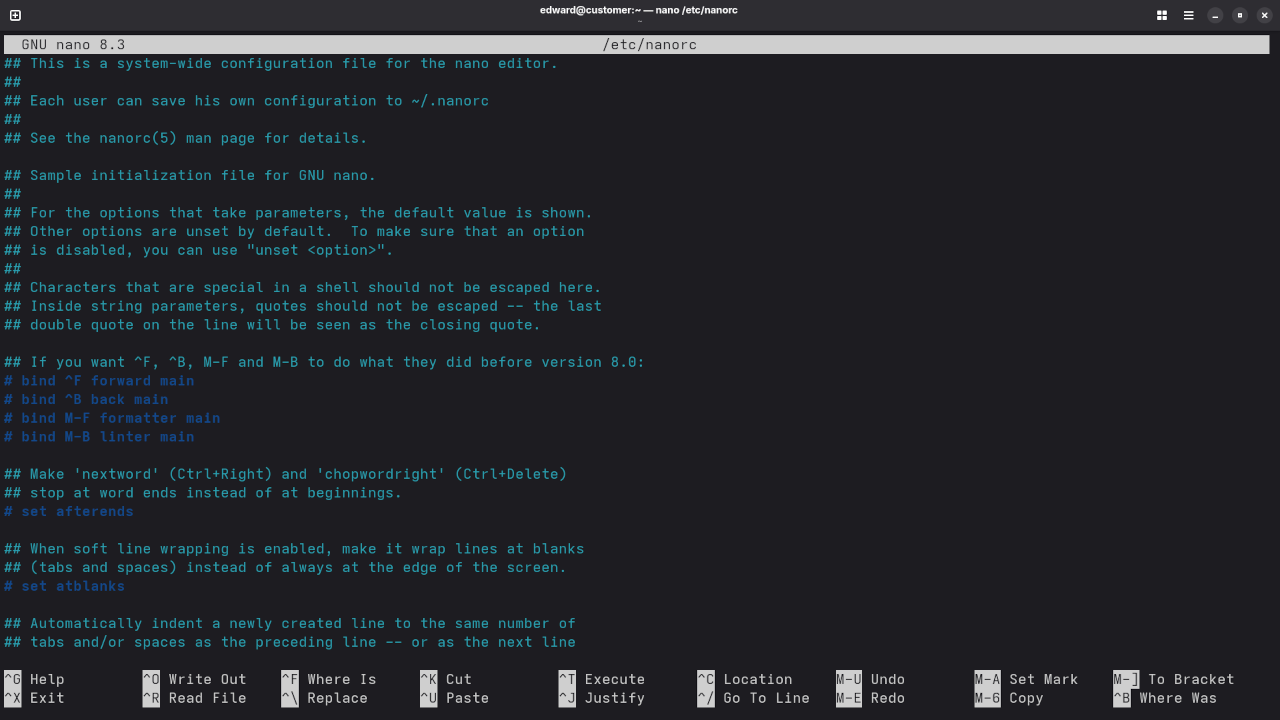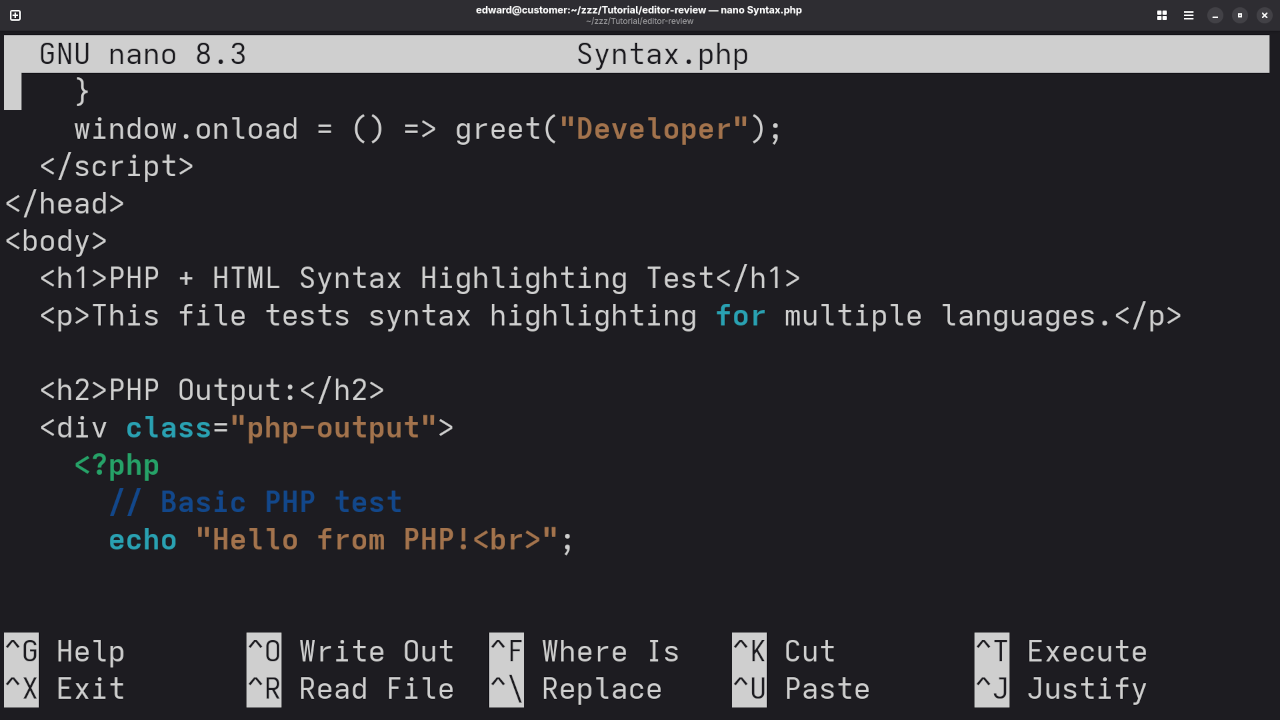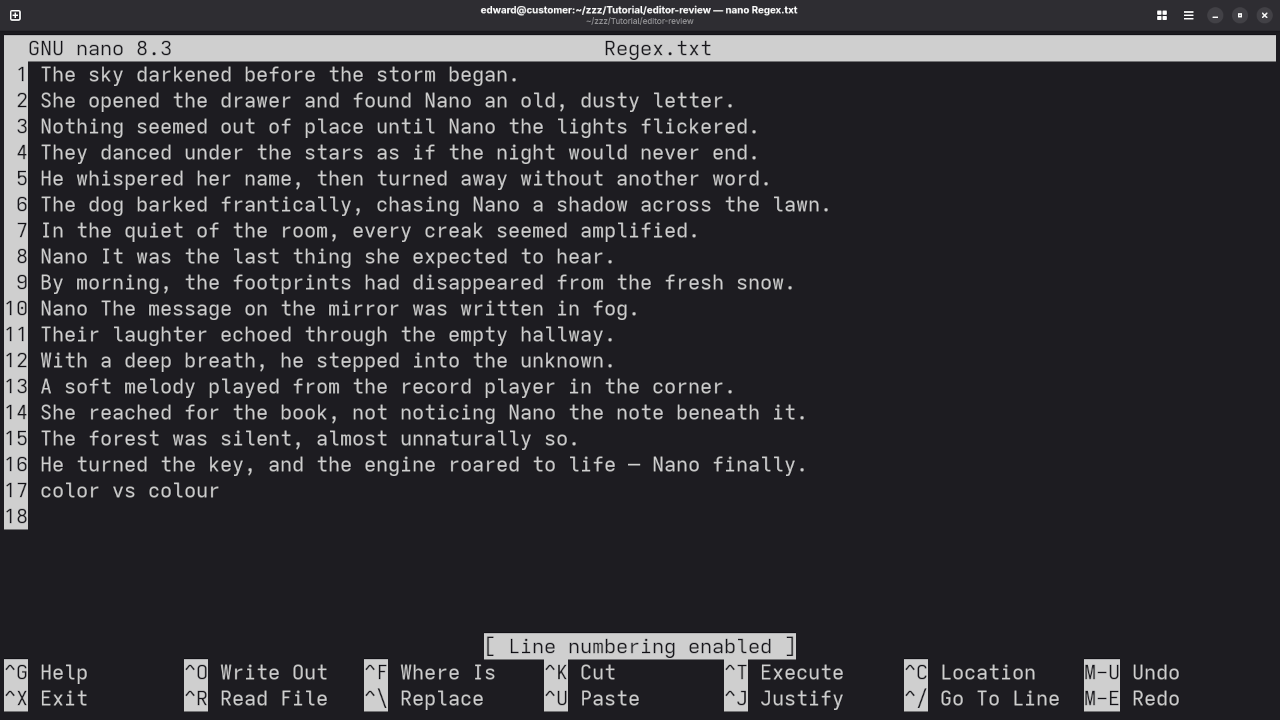GNU Nano: Beginner-Friendly Open Source Text Editor for Fedora Linux
GNU Nano is a free, open-source, and easy-to-use command-line text editor. It’s an ideal starting point for Linux users who want to edit files in the terminal without the steep learning curve of more advanced editors like Vim or Emacs.
Nano is distributed under the GNU General Public License v3 (GPLv3), which ensures that it remains free to use, modify, and distribute. It’s especially useful for quick edits to configuration files, scripts, or coding in lightweight environments.
Why Choose GNU Nano?
- Simple Interface: Clear, on-screen shortcuts and menu options make it user-friendly.
- No Learning Curve: Perfect for beginners who need a text editor inside the terminal.
- Built-In Help: Common commands are listed at the bottom of the screen.
How to Install GNU Nano
Nano comes pre-installed on many Linux distributions, but if it’s not, you can install it manually using your system’s package manager.
Fedora Linux (Main Focus)
sudo dnf install nanoUbuntu / Debian
sudo apt update
sudo apt install nanoArch Linux
sudo pacman -S nanomacOS (via Homebrew)
brew install nanoWindows
For Windows users, Nano can be accessed via Windows Subsystem for Linux (WSL) or used inside terminal emulators like Git Bash.
Screenshots and Screencast



👉 Screencast showing a beginner session in GNU Nano—editing, saving files, and navigating buffers.
Requirements For Programming Text Editor
Glossary:
Code Editor
Designed for writing and editing source code.
IDE
Integrated Development Environment combines various tools need for software development.
Plugin
Software component that adds specific functionality.
Theme
Preset package containing graphical appearance to customize look and feel.
Open source
Freely available for possible modification and redistribution.
SCM
Source code management use to manage and track modifications to a source code repository.
LMB
Left Mouse Button (LMB) or left click
Test Tools
| Name | Description |
|---|---|
| CPU | Intel(R) i7 2600 @ 3.40GHz. |
| Memory | 16GB DDR3. |
| Operating System | Fedora Linux Workstation 42. |
| Desktop Environment | Gnome 48. |
| Name | Description |
| Name | Description |
|---|---|
| Large File | 1GB human-readable text. |
| Regex File | Text with word “GNU Nano” repeated. |
| Syntax File | PHP file containing HTML, CSS & JavaScript. |
| Media File | Smiley face or Tux Linux JPEG file. |
| Java Version | OpenJDK 21.0.8. |
| PHP Version | PHP 8.4.11. |
| Python Version | Python 3.13.7. |
| GNU Nano Version | 8.3. |
| Name | Description |
Test Scoring
- Each feature has two parts.
- Score of zero indicates a missing feature.
- A part of a feature is work a score of 0.5.
Three bias elimination steps were utilized. The editor was used for at least three years on different platforms. Attempts were made to get stable plug-ins for missing features. The same editor was compared between the one in the repository, the developers website, and the compiled version if applicable.
Selecting Editor Version
For this review, GNU Nano was installed using the instructions from the developers website and it did not require additional plugins.
Features
- The theme can be native for the editor in terms of the background. GNU Nano dark and light themes can be created or downloaded and changed using the
nanorcsystem-wide in/etc/nanorcor user-specific~/.nanorcfile with custom settings such asset numbercolor "white,black"orset titlecolor "black,white". The score for the theme was a perfect 1.0. - Dragging and dropping a text file into the editor opens a new tab or buffer using
^Rto read the file. It is not possible to specify the tab location during the drag and drop operation. The score for drag and drop into editor was 0.5. - Opening a very large text file did not crash GNU Nano. GNU Nano was able to edit the large file. The score for opening a large file was a perfect 1.0.
- Multiple documents can opened in multiple tabs or buffers using the optional
^Randset multibufferin the nanorc file. Tear-off tabs do not work but GNU Nano has a feature to open in new window as a new instance which is handy for multiple monitors. The score for multiple documents was 0.5. - Multiple editors can be opened as new tabs without drag options. Each tab window view can not be split either vertically or horizontally as a multiple editor view, but can be implemented as a feature of terminal multiplexers. The score for multiple editor view was 0.5.
- Creating non-project files is possible. Non-project files can be opened on the command line. The score for creating non-project files was a perfect 1.0.
- Soft word wrap can be enabled on all documents as line wrapping. Automatic soft wrap for documents is available from the GNU Nano settings or
set softwrapin the nanorc file. The score for word wrap was a perfect 1.0. - Spell check works as words are typed. It is toggled by
set spellerin the nanorc file. Spelling errors are shown in opened documents. The score for spell check was a perfect 1.0. - Word count is available for GNU Nano. Word count for the current buffer or file is enabled with
CTRL-CandALT-D. Selection word count is available as part of word count. The score for word count was a perfect 1.0. - Go to line can jump to a specified line using
CTRL-SHIFT-_and entering the line number, column number. It is possible to jump to either the first or last line. The score for go to line is a perfect 1.0. - Indentation can default to user-defined tab stops using
ALT/OPTION-AorESC-A. Children are automatically indented. The score for indentation was a perfect 1.0. - Fonts can be not dynamically scaled with keyboard shortcuts or the mouse, but can be manually set in the terminal. The system font can be bypassed and a new editor font and size can be set. The score for fonts was 0.5.
- Find and replace using regular expressions can be utilized for all open documents in the current session. Find and replace will work for the current document or a selection in the current document. The score for find and replacing using regular expressions was a perfect 1.0.
- Multiple language syntax highlighting in one file is enabled if the language syntax files are included or all
include "/usr/share/nano/*.nanorc"and toggled byALT-YorMETA-Y. Each language has code-sensitive syntax colours which can be modified such asinclude "/usr/share/nano/python.nanorc". The score for multiple language syntax highlighting was a perfect 1.0. - Code folding does not work for markup languages such as HTML. Code folding also does not works for programming languages such as Java. The score for code folding was 0.0.
- Selecting rectangular block per column does not work. Rectangular block selection does not work with word wrap enabled. The score for selecting rectangular block was a perfect 0.0.
- Multiple selection is not available for GNU Nano. Search multiple selection is not available. The score for multiple selection was 0.0.
- Distraction-free mode to hide panes works. Line numbers can be toggled using
ALT-SHIFT-3orset linenumbersin nanorc file to improve distraction-free mode. The score for distraction-free was a perfect 1.0. - The file manager can not be enabled. Media files cannot be dragged and dropped into the file manager pane. The score for file manager was 0.0.
- Terminal can not be enabled. The terminal does not follow folder. Terminal can execute system commands. The score for terminal was 0.0.
Results
GNU Nano is a simple command line text editor. By default, the GNU Nano editor is missing required features that can be implemented in the terminal. For my required features, the GNU Nano editor scored 62.50% or 6.25 out of 10.
More From Edward Ojambo
- Programming Books:
https://www.amazon.com/stores/Edward-Ojambo/author/B0D94QM76N - Programming Courses:
https://ojamboshop.com/product-category/course - One-on-One Online Programming Tutorials:
https://ojambo.com/contact - Nano Installation or Migration Services:
https://ojamboservices.com/contact
Final Thoughts
Whether you’re editing a config file or writing your first shell script, GNU Nano is a lightweight, no-fuss text editor that gets the job done. It’s especially perfect for beginners on Fedora Linux and beyond.
If you need help installing or migrating nano, or want to level up your programming skills, feel free to
get in touch. I’m here to help.
Disclosure: Some of the links above are referral (affiliate) links. I may earn a commission if you purchase through them - at no extra cost to you.
